#Boolean Search Operator
Explore tagged Tumblr posts
Text
The Beginner's Guide to Boolean Search Operators
In today's digital age, information overload is a common challenge. With vast amounts of data available at our fingertips, finding relevant information efficiently has become increasingly crucial. This is where Boolean search operators come into play.
Whether you're a student researching for a paper, a professional seeking specific data, or simply a curious individual browsing the web, mastering Boolean search operators can significantly enhance your search capabilities.
In this beginner's guide, we'll delve into what Boolean search operators are, how they work, and how you can use them effectively to streamline your online searches.

Understanding Boolean Search Operators
Boolean search operators are special terms or symbols used to connect and define the relationships between keywords when conducting searches. These operators are named after George Boole, a 19th-century mathematician whose work laid the foundation for modern computer science and logic. By using Boolean operators, you can create more precise and targeted search queries, resulting in more relevant search results.
The three primary Boolean operators are AND, OR, and NOT. Let's explore each of them:
AND: This operator narrows down your search results by requiring all specified keywords to be present in the results. For example, if you're searching for articles related to both "artificial intelligence" and "machine learning," you would use the "AND" operator to ensure that only articles containing both terms are returned.
OR: Unlike the "AND" operator, the "OR" operator broadens your search by including results that contain either of the specified keywords. For instance, if you're interested in reading about either "virtual reality" or "augmented reality," you would use the "OR" operator to retrieve articles containing either term.
NOT: The "NOT" operator excludes specific keywords from your search results. It's particularly useful for refining your search and eliminating irrelevant information. For example, if you're researching "climate change" but want to exclude any articles related to politics, you could use the "NOT" operator to filter out political content.
Practical Examples
Let's illustrate how these Boolean operators work with a few practical examples:
Example 1: Search Query: artificial intelligence AND robotics Result: This query will return articles or resources that contain both the terms "artificial intelligence" and "robotics," providing information specifically related to the intersection of these two fields.
Example 2: Search Query: virtual reality OR augmented reality Result: This query will retrieve articles or resources that include either "virtual reality" or "augmented reality," broadening the scope of the search to encompass both technologies.
Example 3: Search Query: climate change NOT politics Result: This query will exclude any articles or resources that mention politics in the context of climate change, allowing for a more focused exploration of scientific or environmental aspects.
Advanced Techniques
In addition to the basic Boolean operators, there are more advanced techniques you can use to further refine your searches:
Parentheses: Parentheses can be used to group terms and control the order of operations in complex search queries. For example, (artificial intelligence OR machine learning) AND robotics ensures that articles related to either artificial intelligence or machine learning, in conjunction with robotics, are returned.
Quotation Marks: Quotation marks are handy for searching for exact phrases. If you're looking for a specific term or phrase, enclose it in quotation marks to ensure that the search engine retrieves results containing the exact phrase rather than individual words.
Wildcard (*): The asterisk (*) serves as a wildcard character that represents any number of characters in a search query. For instance, "data * techniques" will return results containing phrases like "data mining techniques," "data analysis techniques," etc.
Synonyms: Incorporating synonyms into your search queries can expand your search results. For example, if you're researching renewable energy, you might include synonyms like "sustainable energy" or "clean energy" to capture a broader range of resources.
Tips for Effective Searches
To maximize the effectiveness of your searches using Boolean operators, consider the following tips:
Be Specific: Clearly define your search objectives and choose keywords that accurately represent the information you're seeking.
Experiment: Don't be afraid to experiment with different combinations of Boolean operators and search terms to refine your results.
Use Advanced Search Options: Many search engines offer advanced search options that allow you to specify Boolean operators and other parameters directly.
Review Search Results: Always review the search results to ensure they meet your criteria. If necessary, adjust your search query accordingly.
Conclusion
Mastering Boolean search operators is a valuable skill that can significantly enhance your ability to find relevant information online. By understanding how to use AND, OR, and NOT operators effectively, as well as employing advanced techniques like parentheses and wildcards, you can refine your searches and access the information you need more efficiently.
1 note
·
View note
Note
hey! i’m super new to motogp, i was wondering if you would be able to point me in the direction of journalists who are generally trustworthy? if there are any haha. bo worries if not, thanks!!!
trustworthy is an interesting concept as we are all god's fallible little idiots but im DIGRESSING ! i get what you mean ummm lets see typically if you wanna know #thebusiness on a race weekend via social media, i'd recommend following mat oxley, david emmett (now only consistently available on bluesky), simon patterson if you can stomach it (or just wait for tumblr moots to filter out the relevant bits), valentin khorounzhiy, adam wheeler, and neil morrison. in terms of the guys whose articles i actually make sure and read its like val dave and oxley, and then as needed i head over to crash.net and pick up pete mclaren and lewis duncan sometimes. all these bitches also run podcasts (oxleybom, paddock pass, the race motogp, crash motogp pod). i would rate the podcasts in that order tbh but you usually get different opinions from the different crews so theres stuff for everyone AND i think its fun to get a bead on how much opinions can vary in the paddock among the press writ large. like okay so you guys ALSO dont know for sure about this thing okay cool im doing good...
#like in terms of english speaking news websites its motorsports magazine comma the race comma crash comma motomatters#and then theres a few spanish ones that i'll translate if dante sends me somethin or im diggin deeper#callie speaks#asks#go forth... search mat oxleys twitter using an insane amount of boolean operators to get at stuff concerning marc from 2014... i did....#mgp
28 notes
·
View notes
Text
Considering murder because i'm in google looking for a diagram of a lipopolysaccharide in the gram negative bacterial cell wall.
And google is like "did you mean polysaccharide?" and it only displays polysaccharides in the search results.
And so I go and I make the search term "lipopolysaccharide" in quotations. and it says "did you mean "polysaccharide"?"
And I understand I could search for endotoxin but it's the principle of the thing I want the search engine to search the word I give it! not something approximate! Google should consider the concept that LPSs exist, and putting search terms in quotations should work!
so when the google servers are destroyed tomorrow in an arson attack at 2PM GMT+8, It wasn't me that did it but I really wish it was.
#google#search engine#lipopolysaccharides#Tumblr has that tag for it autofilled??!?!??? fuck you google search engine!#and don't even get me started on how boolean operators are useless now
4 notes
·
View notes
Text
I'm a bad IT professional and have continued to use google as a search engine mostly out of prejudice for what duckduckgo was when it first started. However, I am not too proud to admit when I'm wrong, and duckduckgo has just done in one search what google has been convincing me for three and a half days was impossible.
brb changing my default search engine everywhere.
#my boss's boss's boss told me specifically that I should check something out bc it's his favorite place and he thought I would enjoy it#and I have spent DAYS trying to build out search terms with the details I remember to track it down#and google just kept giving me the same list of only semi-relevant results in slightly different orders#with no impact from the things I was changing in the query#and then as a hail mary in the hopes that I wasn't gonna have to ask someone at work I tried duckduckgo#and it was the second result which had been nowhere in the first two pages of google results no matter what I tried#god I'm actually like. legit mad at how low searching has gotten.#like! no boolean operator functionality!#wtf!#anyways I have been saved from one or more awkward work situations and also I get to go to a farmers market and also buy furniture#LT talks
6 notes
·
View notes
Text
I wish platforms that either 1. give recommendations or 2. display a lot of aggregate data/products/posts based on "relevance" or "featured" would discuss how their algorithm works. I need to know what factors actually go into this calculation and how it is actually weighted.
#hal rambles#what would be REALLY cool is one where it kept track of the factors but allowed the user to specify the algorithm#most platforms would not bother with this (*reasonable*) and i'm sure many users would find it to be a steep learning curve#but i would adore it#and of course lots of sorting and filtering options + Boolean operators and truncation (which preferably one would also be able to choose#what they wish to search through. for ex. applying the search to terms in reviews)#but. this takes a lot of dedication and expertise on the part of developers and requires faith in the userbase to actually use the features#instead of just going 'ugh! this algorithm sucks' when they haven't done anything at all to look for what they want#i genuinely think the hyper-algorithmic nature of most sites like this these days#where the algorithm is just some mysterious force that serves you what you want to see#ruins people's ability and willingness to seek out...anything really
2 notes
·
View notes
Text
I also really like that the protagonists' learning process for these hacks very much includes receiving and/or passing along information in meatspace. We lament the slow disappearance of specialized forums and subreddits for finding people who've tackled the problem before, and that DOES suck, but the next step isn't to give up searching. It's to go from passive searching on the Internet to actively asking around - online and offline. A reference librarian has research experience and database access you don't have. A professor/instructor at your local university or community college would love to infodump on anyone who seems interested in their obscure knowledge niche. Your fellow hobbyists are a rich source of knowledge, especially for when the problem involves messing with hardware and it's just easier to show each other in-person. And so on, and so on.

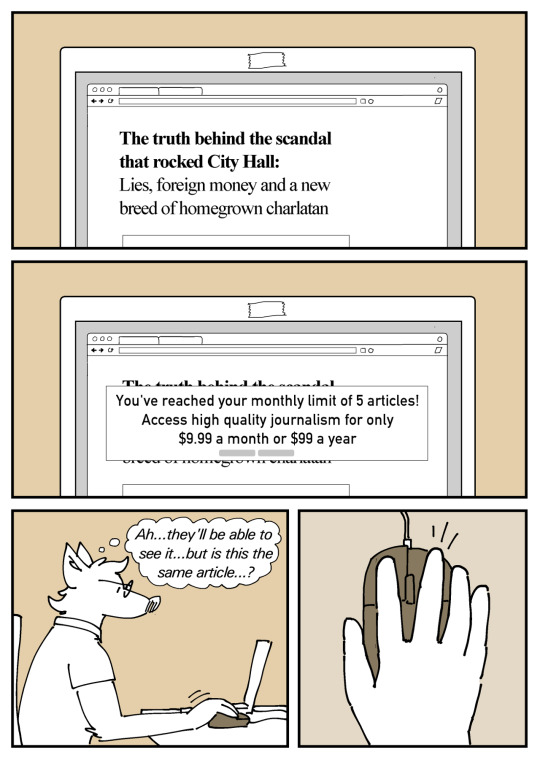
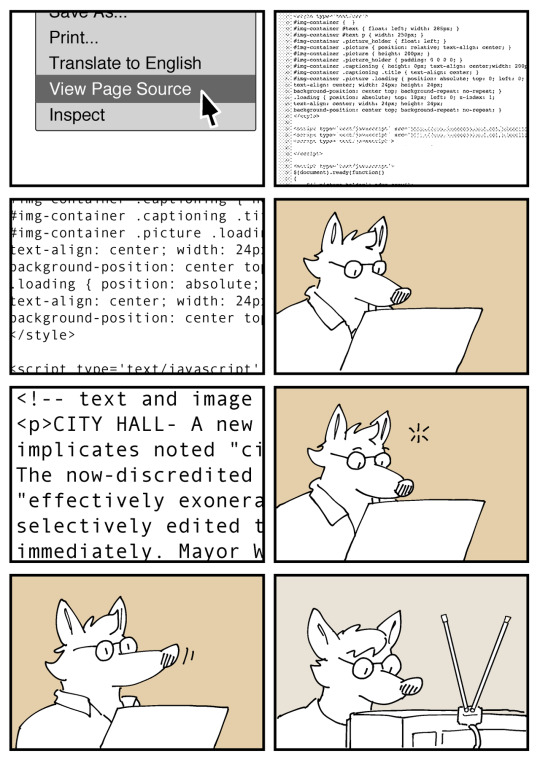




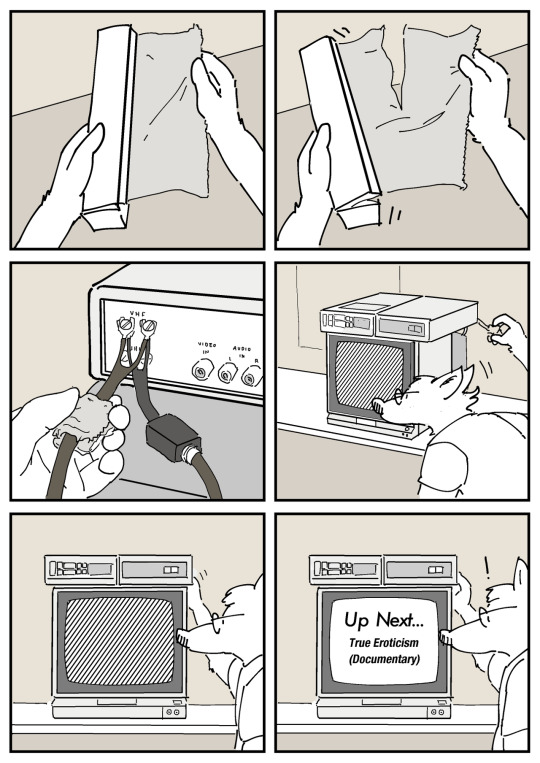
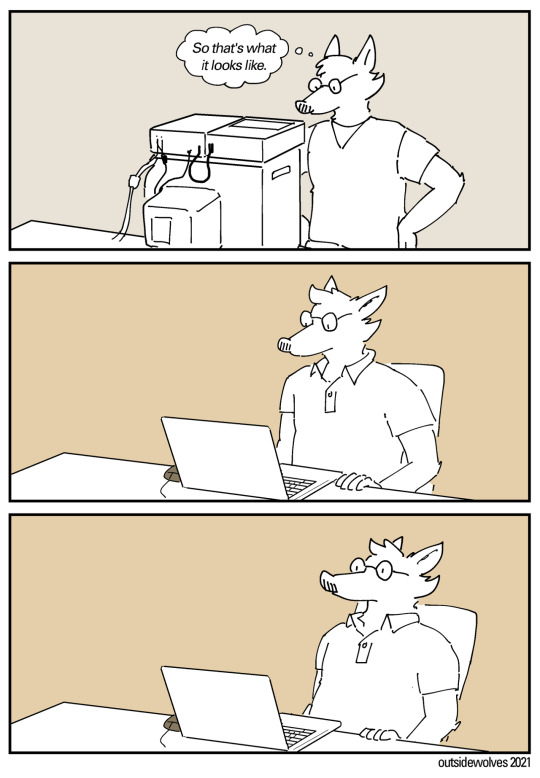
#yo ho ho and a bottle of rum#I'm still incredibly cheesed off whenever a 2024-era search engine doesn't recognize quotation marks or boolean operators#also 'can it run DOOM' might be a joke meme#but it reminds us that technology isn't an opaque magic box#you *can* eventually get down to the base code/wires/electricity with enough time and determination#technology
84K notes
·
View notes
Text
RIVERDALIANS WAKE UP!
this is a pre-S07 video so some of its arguments haven't aged the best, but my god, imagine someone actually doing interesting and good analysis of Riverdale. watch this instead of the second Super Eyepatch Wolf video.
anyway, this is a really interesting and fun video with actual analysis of the show in interesting ways (though a few others have articulated similar arguments in other ways, like Quinn Curio's video talking about Archie's plotlines undercutting the seriousness of the others.) but like, it's actual analysis of the show, besides just saying it's cringe or badly written or whatever. like Kennedy still thinks the show is "so bad it's good" but like. whatever, at least there's actually any literary analysis here. it's a pretty good video essay with interesting analysis on the show and its relation to postmodernism and fragmentation.
youtube
#james talks#riverdale#figured out you can use booleans and operators in YouTube search and came upon this within 5 minutes of searching#now i can easily look up riverdale on there and not feel like i need to teach some people how to have interesting takes on stuff#and i no longer have to sift through 100 videos calling the show cringe bc i can just exclude any video with the word in it.#literally cannot believe i had to figure that out myself#anyway genuinely just wild how easily i found this when i made the search bar actually functional#video essay#Youtube
5 notes
·
View notes
Text
spent a good 20 minutes yesterday daydreaming about what a hypothetical personal website for myself would look like
#one of these days ill learn html#plum rambles#if i implement any kind of search or filtering system#youll be able to drag an drop little blocks labeled with boolean operators into it#there would be an accessibility settings button#and settings would be saved with cookies#everything. EVERYTHING would have tooltips#and lists would be categorized with silly little icons for different categories#thered be a legend at the top of the page where you could click on an icon to filter it#i want it to be like. something you can play with. toy block ass website#the home page would have art of me (irl human appearance) and Tir (turtlesona) posing back to back#with buttons for the main pages to the right of them#the top or bottom of the site would have a banner saying that i dont know what im doing and to contact me#if you have accessibility concerns or encounter bugs#maybe have a little google form as an alternative to emailing me bc emails are scary!!#anyways. um.#plum rambles (in the tags)#web design
0 notes
Text
In my personal experience, DuckDuckGo is not as effective as Google (completely ignores boolean operators, for example) but its ethics are solid. I am super excited to hear about searchmysite tho! No ads? Excellent.
I’m sorry friends, but “just google it” is no longer viable advice. What are we even telling people to do anymore, go try to google useful info and the first three pages are just ads for products that might be the exact opposite of what the person is trying to find but The Algorithm thinks the words are related enough? And if it’s not ads it’s just sponsored websites filled with listicles, just pages and pages of “TOP FIFTEEN [thing you googled] IMAGINED AS DISNEY PRINCESSES” like… what are we even doing anymore, google? I can no longer use you as shorthand for people doing real and actual helpful research on their own.
113K notes
·
View notes
Text
KIP'S BIG POST OF THINGS TO MAKE THE INTERNET & TECHNOLOGY SUCK A LITTLE LESS

Post last updated November 23, 2024. Will continue to update!
Here are my favorite things to use to navigate technology my own way:
A refurbished iPod loaded with Rockbox OS (Rockbox is free, iPods range in price. I linked the site I got mine from. Note that iPods get finicky about syncing and the kind of cord it has— it may still charge but might not recognize the device to sync. Getting an original Apple cord sometimes helps). Rockbox has ports for other MP3 players as well.
This Windows debloater program (there are viable alternatives out there, this one works for me). It has a powershell script that give you a little UI and buttons to press, which I appreciate, as I'm still a bit shy with tech.
Firefox with the following extensions: - Consent-O-Matic (set your responses to ALL privacy/cookie pop-ups in the extension, and it will answer all pop-ups for you. I can see reasons to not use it, but I appreciate it) - Facebook Container ("contains" Meta on Facebook and Instagram pages to keep it from tracking you or getting third party cookies, since Meta is fairly egregious about it) - Redirect Amp to HTML (AMP is designed for mobile phones, this forces pages to go to their HTML version) - A WebP/AVIF image converter - uBlock Origin and uBlacklist, with the AI blacklist loaded in to kill any generative AI results from appearing in search engines or anywhere.
Handbrake for ripping DVDs— I haven’t used this in awhile as I haven’t been making video edits. I used this back when I had a Mac OS
VLC Media Player (ol’ reliable)
Unsplash & Pexels for free-to-use images
A password manager (these often are paid. I use Dashlane. There are many options, feel free to search around and ask for recs!). There is a lot that goes into cybersecurity— find the option you feel is best for you.
Things I suggest:
Understanding Royalty Free and the Creative Commons licenses
Familiarity with boolean operators for searching
Investing in a backup drive and external drive
A few good USBs, including one that has a backup of your OS on it
Adapter cables
Avoiding Fandom “wikias” (as in the brand “Fandom”) and supporting other, fan-run or supported wikis. Consider contributing if its something you find yourself passionate or joyful about.
Finding Forums for the things you like, or creating your own*
Create an email specifically for ads/shopping— use it to receive all promotional emails to keep your inbox clean. Upkeep it.
Stop putting so much of your personal information online— be willing to separate your personal online identity from your “online identity”. You don’t owe people your name, location, pronouns, diagnoses, or any of that. It’s your choice, but be discerning in what you give and why. I recommend avoiding providing your phone number to sites as much as possible.
Be intentional
Ask questions
Talk to people
Remember that you can lurk all you want
Things that are fun to check out:
BBSes-- here's a portal to access them.
Neocities
*Forums-- find some to join, or maybe host your own? The system I was most familiar with was vbulletin.
MMM.page
Things that have worked well for me but might work for you, YMMV:
Limit your app usage time on your smartphone if you’re prone to going back to them— this is a tangible way to “practice mindfulness”, a term I find frustratingly vague ansjdbdj
Things I’m looking into:
The “Pi Hole”— a raspberry pi set up to block all ads on a specific internet connection
VPNs-- this is one that was recommended to me.
How to use computers (I mean it): Resources on how to understand your machine and what you’re doing, even if your skill and knowledge level is currently 0:
This section I'll come back an add to. I know that messing with computers can be intimidating, especially if you feel out of your depth. HTML and regedits and especially things like dualbooting or linux feel impossible. So I want to put things here that explain exactly how the internet and your computer functions, and how you can learn and work with that. Yippee!
848 notes
·
View notes
Text
Searching best practices on JSTOR
Hi Tumblr researchers,
As promised, we're going to dive into some best practices for searching on JSTOR. This'll be a long one!
The first thing to note is that JSTOR is not Google, so searches should not be conducted in the same way.
More on that in this video:
youtube
Basic Search on JSTOR
To search for exact phrases, enclose the words within quotation marks, like "to be or not to be".
To construct a more effective search, utilize Boolean operators, such as "tea trade" AND china.
youtube
Advanced Searching on JSTOR
Utilize the drop-down menus to refine your search parameters, limiting them to the title, author, abstract, or caption text.
Combine search terms using Boolean operators like AND/OR/NOT and NEAR 5/10/25. The NEAR operator finds keyword combinations within 5, 10, or 25 words of each other. It applies only when searching for single keyword combinations, such as "cat NEAR 5 dog," but not for phrases like "domesticated cat" NEAR 5 dog.
Utilize the "Narrow by" options to search for articles exclusively, include/exclude book reviews, narrow your search to a specific time frame or language.
To focus your article search on specific disciplines and titles, select the appropriate checkboxes. Please note that discipline searching is currently limited to journal content, excluding ebooks from the search.
youtube
Finding Content You Have Access To
To discover downloadable articles, chapters, and pamphlets for reading, you have the option to narrow down your search to accessible content. Simply navigate to the Advanced Search page and locate the "Select an access type" feature, which offers the following choices:

All Content will show you all of the relevant search results on JSTOR, regardless of whether or not you can access it.
Content I can access will show you content you can download or read online. This will include Early Journal Content and journals/books publishers have made freely available.
Once you've refined your search, simply select an option that aligns with your needs and discover the most relevant items. Additionally, you have the option to further narrow down your search results after conducting an initial search. Look for this option located below the "access type" checkbox, situated at the bottom left-hand side of the page.
Additional resources
For more search recommendations, feel free to explore this page on JSTOR searching. There, you will find information on truncation, wildcards, and proximity, using fields, and metadata hyperlinks.
#happy researching!!!#jstor#research#academic research#academic writing#academia#academic database#searching#higher education#students#colleges#university#learning#teaching#librarians#libraries#Youtube#studyblr#ref
4K notes
·
View notes
Note
Are there plans to include boolean operators (AND, OR, & NOT) and parentheses to the current search operators that were recently added?
Answer: Hey there @fourcheesecalzone!
This would be very cool to have! Our team is currently busy improving the in-blog search experience, so we might work on this during our next Hack Week. But this is definitely something that we would love to work on—watch this space and keep an eye at @changes!
84 notes
·
View notes
Text
I'm sure many of you are already aware of this, but in case I have any newer tumblr users, pet bill donation scams are very common on this site. If someone DMs or sends you an ask asking you to reblog some sort of donation post for a sick/injured pet, it is most likely a scam.
Below the cut, I have included tips to spotting a scam, and why I believe the post by 507-on-queue is a scam. @kyra45 runs an excellent tumblr scam awareness blog, and has more information and tips here about spotting pet scams. I have archived the scam post in question on my side blog here.
Here's some ways to spot these scams:
Age of the blog - most scam blogs are a week old or younger, they are often under a day old
Similar urls being used for multiple blogs - scam blogs are typically blocked/deleted rapidly, and the OP makes a new account with almost the same name
The blog bio/pfp are not unique
You can only access the dashboard view of the blog so the post archive cannot be accessed (for example, my dashboard view is this, but you can also visit my webpage view and see my 9 years of post history via /archive lol)
The blog has never interacted with you before
The blog follows you and immediately sends a DM/ask
The DM/ask is overly polite and guilt trips (they often ask you to reply privately to reduce digital footprint)
Images of pets can be found via reverse image search
OP's story is inconsistent or unrealistic
The Paypal link does not match the supposed country OP lives in
Most recently, a scam post has been going around about a sphynx cat named Draven. This has been done using multiple urls, including:
meer-lion (deactivated)
507-on-queue (deactivated)
507onqueue (deactivated)
507-onqueue (current as of Jan 13th, 2024)
Here's how this blog meets our scam watch criteria:
The current blog (507-onqueue) is less than a day old (19 hours at the time of this post). The oldest post:

As listed above, OP uses multiple, similar URLs.
The bio of 507-onqueue is taken almost directly from another user (said user). Due to the same bio being used in previous scams, I suspect this is the same or related person to kappa-tundra/kappatundra (about this scam).
Scam blog:

Copied blog:

Only dashboard view is available.
The blog follows and immediately DMs/sends and ask. From my account:

The ask from the account is very polite, guilt trips, and asks me to answer to the post privately. The goal of being so polite is to win your trust and lower your defenses. This isn't the worst guilt trip I've been in a scam (that goes to the child support scam from several years ago). By asking me to reply privately, they're attempting to reduce their digital footprint (making them harder to google) and disguise how much they are spamming asks.

The information in that post was taken from a private Facebook account (source). I found the Facebook account in question and confirmed that the information was taken from there. I do not want to share the page because I view that as a further violation of the Facebook OP's privacy. For transparency, the images of Draven are not on Facebook OP's page any longer, but there are several other identifiable pieces of information that make it more than likely that the claims of her information being stolen are true.
The ask is inconsistent itself with the name of the cat (Draven vs Indie). This is also nearly identical to another scam ask from user captbridges. This user was using a real GoFundMe for a sick cat to scam.
The medical paperwork in OP's post is for a veterinary hospital in Wisconsin. However, OP's PayPal is based in the Philippines. The country.x= part of the url indicate the country of origin of the account; PH is the Philippines. The local.x= part of the url shows that the link was localized to the United States (making the donation currency USD). (PayPal's information page about country codes).
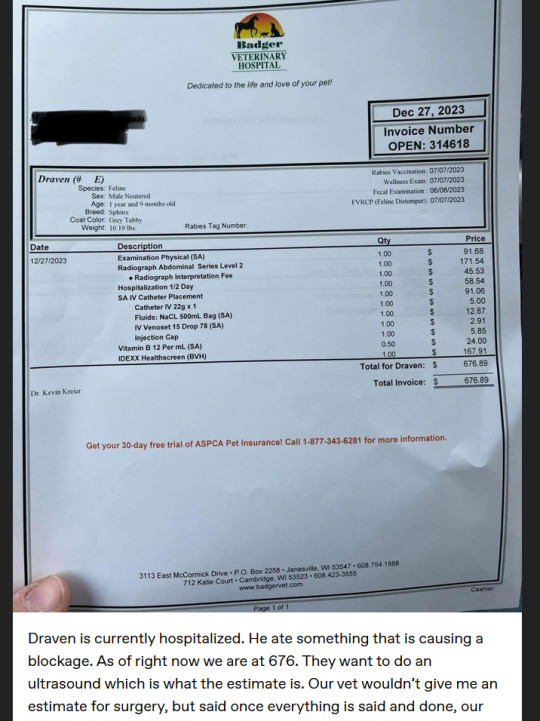

Stay safe out there and remain vigilant, everyone. If you don't already know them, try to pick up some boolean operators to refine your google searches when checking for scams. The tumblr search function sucks, so this is your best bet of finding information about scams like these online.
#meer-lion#507-on-queue#507-onqueue#507onqueue#scam alert#scam#You all can feel free to reblog this if you want#I normally make posts like this when a scam comes my way#But I haven't actually seen one in a while lol
244 notes
·
View notes
Text




Cis* ( Cis with an asterisk ) and Tris* ( Tris with an asterisk ) flags
These represent the same Boolean search operation as my Trans* ( Trans with an asterisk ) flags do, where an asterisk is used to find all content with the same prefix, regardless of suffix.
More simply, Trans* includes everyone under the Trans- umbrella- similar to how Queer is a broad / inclusive community term. These function similarly, but with the Cis- and Tris- prefixes !!
( You can read more about the history of the Boolean / Trans Asterisk ( including some common misconceptions ) and usage in Nonbinary / Genderqueer symbols and Gender Neutral / Inclusive Language in this post here. )
Made using this general Cis flag by @ryanyflags ( since it can be used for the general prefix already ) and a simplified version of these Tris flags by julietianboy.
The Tris simplification ended up being a little close to Ryany's existing Tciaspec flag, so I apologize for that. I just wanted to keep them simple since the Asterisk symbol in the middle can make it look cluttered very quickly. The anon who requested this also clarified that Cis* here is differentiated from Asteriskgender.
Free for anyone to use anywhere as always !! Anon only requested Cis* but I wanted to make Tris* to round it out, since Tris is often forgotten. Please no arguing on here. I will delete it as I have no energy and the posts linked in this should clarify everything. Thank you !!
These are being posted from Bug's drafts. If there are any mistakes please let me know so we can correct them.
#cis#cis*#tris#tris*#mogai flag#liom flag#mogai#liom#mogai pride#liom pride#mogai friendly#liom friendly#mogaisafe#liomsafe#mogai community#liom community#cis with the asterisk#tris with the asterisk
17 notes
·
View notes
Text
flexing my actual professional skills in this chapter of six feet under to write vace trying to search a database and absolutely whiffing it.
he is failing that organisation challenge. he does not have that dog in him. (the dog is knowledge of boolean operators)
9 notes
·
View notes
Text
google sucks now. like i have a literal master's degree in library sciences and i can say with confidence that google sucks now. i should not have to pull out the boolean operators to find what i want with the world's most widely used search engine. google fucking sucks now. whatever. thank god actually. now that it sucks, duckduckgo is legitimately a better alternative and i am free from my horrid corporate shackles forevermore. goodbye google
134 notes
·
View notes